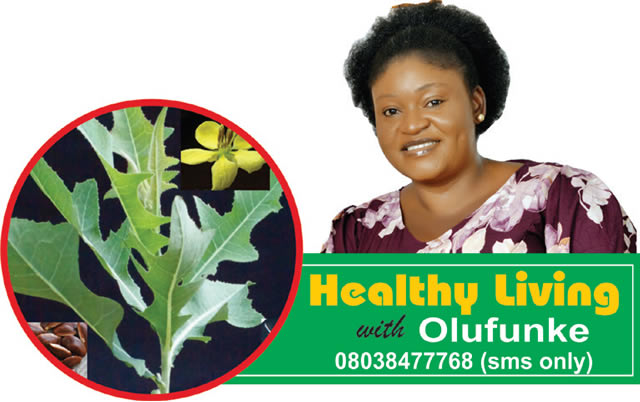
The calamine lotion, python oil and powdered milk remedy we talked about last week is not for consumption. It is meant to be applied on the area where you have hyperpigmentation.
This week, we shall look into foods, fruits and herbs that have hepatoprotective (anything that prevents damage to the liver) qualities. Before I proceed, let me share a story. It is credited to my father. He told me that during one of the war outbreaks in Ile Ife and Modakeke, a plant was used by the people of lle Ife to stop bleeding from gunshot wounds. It happened that a hunter in Ile Ife had gone hunting one day and the animal he shot at managed to escape with gunshot wound. The hunter followed the animal and at a point, the animal plucked the leaves of a particular plant and placed it on the gunshot wound and it stopped bleeding!
Immediately after he finished telling me the story, what came to my mind was how the awareness about medicinal plants started. It was as a result of the many years of struggles against illnesses due to which man learnt to pursue drugs in barks, seeds, fruit bodies and other parts of plants.
Man has also learnt from watching many animal species create their own pharmacies from ingredients that commonly occur in nature. The medications you use were once in the wild!
My concern now is that such plants should not be in the wild only, they should be domesticated. No one prays for war outbreaks but people get wounded on a daily basis and they bleed. Plants like this will come handy in situations where people are far from hospitals where they can be given injections that stop bleeding. This is another confirmation of Dr (Carl) Pfeiffer’s quote that “For every drug that benefits a patient, there is a natural substance that can achieve the same effect.”
Let us see some of the foods, fruits and herbs for liver health:
Coffee:
At first, I was reluctant to add coffee to the list because of my concern that people will start abusing it, but all the studies on it are too promising to be ignored. Do not forget that taking it excessively has some associated dangers. Coffee is a popular beverage and the clinical evidence of the benefit of its consumption in Hepatitis B and C, as well as non-alcoholic fatty liver disease and alcoholic liver disease has been studied. Studies in a 2016 research review have shown that drinking coffee helps lower the risk of cirrhosis or permanent liver damage in people with chronic liver disease. It may also help reduce the risk of developing a common type of liver cancer. It also has positive effects on inflammation. The researchers found that it is even associated with a lower risk of death in people with chronic liver disease. It also increases levels of the antioxidant glutathione. Coffee without added sugars or cream is what gives the benefits.
Fatty fish:
Consuming fatty fish may help reduce the impact of conditions such as non-alcoholic fatty liver disease. Fatty fish is rich in omega-3 fatty acids, which are the good fat that help to reduce inflammation. This fat may be especially helpful in the liver, as they appear to prevent the build-up of excess fat and maintain enzyme levels in the liver. Mackerel, being an oily fish, has high amounts of omega-3s. It is that fish you always run away from eating. It is popularly called Titus or “eja alaran” among the Yoruba.
Olive Oil:
Due to its high concentration of oleic acid and phenols, the same antioxidants found in apples and berries, olive oil can have a protective effect on liver function. It has been documented to aid the prevention and resolution of liver damage.
Onions:
A 2018 study on mice with various diets found that regular consumption of onion can prevent non alcoholic fatty liver disease, even in the presence of other risk factors such as obesity, hypercholesterolemia and high fat and sugar intakes.
Nuts:
Eating nuts may be another simple way to keep the liver and protect against NAFLD. They generally contain unsaturated fatty acids, vitamin E and antioxidants. These compounds may help prevent NAFLD and reduce inflammation and oxidative stress. Walnuts (awusa/asala), peanuts (groundnuts) are in season now.
Cruciferous vegetables:
Cruciferous vegetables like broccoli, brussels sprouts, cabbage, kale and cauliflower are great for the liver.
Green leafy vegetables:
Consuming leafy green vegetables may help decrease your risk of certain types of liver disease. We are in the rainy season, they are in abundance.
Mushrooms:
Animal studies have consistently suggested that mushrooms can alleviate liver disease. A 2020 study on Chinese adults found higher mushroom intake to be significantly associated with lower prevalence of non alcoholic fatty liver disease.
Fermented foods:
We already had a series on fermented foods, so you are familiar with them. Locust bean (iru) ìs a good example.
Seeds:
While on the series on seeds, we discussed flaxseed, hempseed, Chia seed.
Herbs and spices:
There are many herbs and spices that are good for the liver. I will just discuss a few. Milk thistle has been used for over 2,000 years to treat bile duct and liver conditions. Research shows that it may have liver-protective properties. It is regularly used as a complementary therapy by people who have liver damage due to conditions like alcoholic liver disease, non-alcoholic fatty liver disease, hepatitis and even liver cancer.
Garlic, turmeric, ginger are great for the liver too.
Fruits:
Some of the fruits that are good for the liver are grapes, grapefruits, avocado pear, apple, lemon, strawberries, bananas, papaya (pawpaw), blueberries, beetroot, watermelon, citrus fruits like lemon, limes and oranges.
Foods to avoid
Foods high in saturated fat and trans-fat: Saturated fat source include whole milk, trans-fat can be found in a variety of food products like commercially baked goods, such as cakes, cookies and pies. All these must be consumed sparingly.
Sugar: Cutting back on sugar and sugary foods may help reduce the stress on the liver.
Salt: Some simple ways to reduce salt intake include eating out less often. Avoid canned meats and vegetables.
Refined grains: Processed and refined grains are present in white bread, white pasta and white rice. Producers remove the fibre from these highly processed grains and this can raise blood sugar as the body breaks them down.
Eating natural, unprocessed foods is a good starting point. Some people choose to follow specific diet plans, such as the Mediterranean diet. This diet is a particularly good choice for people with NAFLD because it minimises processed food, added sugar and saturated fatty acids.
A study titled ‘Systematic review with meta-analysis: Coffee consumption and the risk of cirrhosis’ by Kennedy et al concludes that increasing coffee consumption may substantially reduce the risk of cirrhosis.
A study titled ‘Hepatoprotective effect of beetroot juice on liver injury in male Sprague–Dawley rats’ by Olumese et al concludes that Beetroot juice has potential hepatoprotective effects on the liver in a dose-dependent manner.





